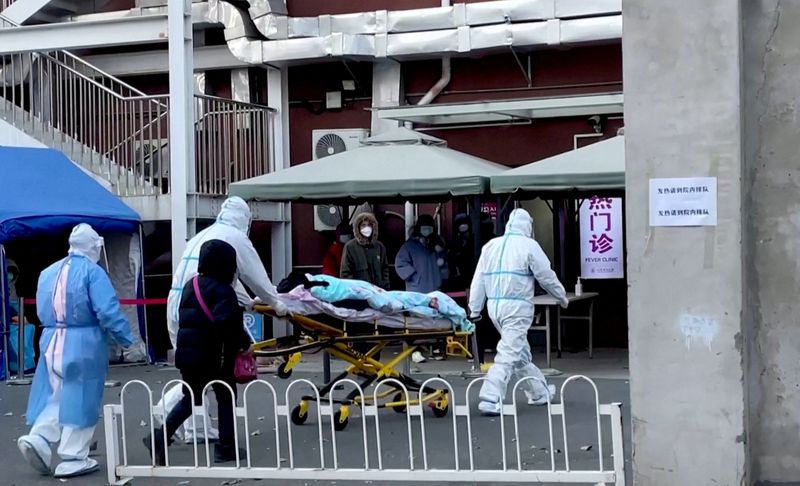By Summer Zhen and Samuel Shen
HONG KONG/SHANGHAI (Reuters) - Global investors, already caught off guard by China's virus-policy U-turn, now find themselves flying blind into a chaotic post-pandemic transition, lacking proper data to track rising infections and potential threats to the economy in the months ahead.
Authorities in China, where official data often confounds investors or is questioned for its reliability, have halted mass testing for COVID-19 and narrowed their reporting of infections, making information even harder to come by.
Investors have been left scouring online search data or other alternatives and are tweaking their tracking models, struggling for a clear view of surging COVID infections and a potential healthcare crisis as the world's second-largest economy reopens.
While confidence remains unshaken that China will emerge with stronger growth in the latter part of next year, the near-term surge in cases poses new challenges to an economy that investors have long found difficult to read.
"It's chaos now," said Joanna Shen, emerging markets and Asia Pacific equities investment specialist at J.P. Morgan Asset Management.
"Let's give one month to see how things will be. Everything is so fast."
J.P.Morgan Asset Management maintains a "neutral" weight on China, preferring a wait-and-see stance for the short term after authorities last week rolled back draconian anti-COVID policies that were strangling the economy.
Markets have also stalled this week, after hints of imminent easing - and last week's announcement of actual measures - had sparked a rally in stock prices and the Chinese currency.
Hong Kong's benchmark Hang Seng Index in November logged its best month since 1998 and continued roaring into the first week of December, but has since lost momentum.
The Shanghai Composite is down nearly 1% this week and the offshore yuan has paused after rallying roughly 4% in November, its best month on record.
Investors see the healthcare system as the economy's primary pressure point, where a breakdown could trigger a return to strict rules, so they are seeking novel ways to track illness and fill the gaps left by increasingly patchy public data.
Officially, China's new infections dropped sharply over the past week, with 2,291 new symptomatic COVID infections reported for Dec. 13, less than half the Dec. 5 peak of 5,046.
But on the ground, the rapid spread of the virus is evident in gossip about community outbreaks, long queues outside fever clinics, and a public scramble for flu drugs.
COVID KEYWORDS
The lack of reliable official COVID data forced Ting Lu, Chief China Economist at Nomura, to turn to unconventional sources such as Baidu (NASDAQ:BIDU) - China's dominant online search engine - to track the state of the pandemic.
A surge in Baidu search frequency for COVID-related keywords pointed to a spike in local infections in the capital city Beijing - likely China's current COVID epicentre - as well as other major cities, Lu wrote in a note to clients on Tuesday.
He predicted unprecedented outbreaks around the Lunar New Year holiday in late January.
David Chao, global market strategist for Asia Pacific at Invesco, said that the end of mass testing has led him to monitor the healthcare system, where any sign of meltdown could trigger a return to lockdowns or other harsh controls.
Another challenge for investors is gauging the potential for worker shortages as infections rise, and assessing how the overall population responds to living with COVID.
Arthur Kroeber, head of research at Gavekal Dragonomics, said China's COVID policy pivot has been so rapid that it has not yet shown up in Gavekal's index of COVID restrictions in Chinese cities. The index tracks and analyses local rules that restrict movement, and these are now in a state of flux.
"I think it is going to continue to be messy in implementation over the next month or two," as China dismantles the restrictions, Kroeber said.
Aninda Mitra, head of Asia macro and investment strategy at BNY Mellon (NYSE:BK) Investment Management, urged investors to be cautious.
"China's pivot to a broader reopening is now under way and warrants optimism, but (it's) not a one-way bet," he wrote in a report that forecasts soaring COVID cases and volatile markets.
Looking at the longer term, however, Morgan Stanley (NYSE:MS) predicted that the reopening would allow China to achieve economic growth of 5% in 2023, compared with an estimated 3% this year.

But Morgan Stanley's chief China economist, Robin Xing, still feels "short-term pain is inevitable".
"GDP growth will likely remain sluggish before spring starts next year," he said.